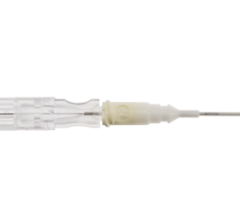December 4, 2007 – The Impella 2.5, a catheter-based heart pump device, supports high-risk patient’s weakened heart in the Abiomed PROTECT I trial conducted at the Texas Heart Institute at St. Luke’s Episcopal Hospital.
Texas Heart Institute at St. Luke’s Episcopal Hospital was one of the few facilities chosen to participate in the Abiomed PROTECT I trial for the Impella 2.5, the first FDA-approved trial for prophylactic, or preventative, use of a device during high-risk percutaneous coronary intervention (PCI) procedures.
In February 2007, one of 20 patients enrolled in the Impella 2.5 PROTECT I trial who had undergone an unsuccessful coronary artery bypass surgery eight months prior to enrollment in the trial, was not a candidate for additional surgical revascualarization and was considered too high risk for standard percutaneous coronary intervention (PCI) procedures. The patient was enrolled in the Protect I Trial, which was designed to evaluate the Impella 2.5 system as a support device to allow PCI procedures in very high-risk patients.
The Impella 2.5 device was advanced into the patient’s heart via his femoral artery in the hospital’s cardiac catheterization lab. While the Impella system supported his weakened heart, multiple stents were safely inserted into the coronary arteries, relieving the obstructions. The patient reportedly returned to a normal life shortly after the Impella 2.5 supported procedure and remains free of chest pain nine months after the procedure.
Abiomed’s Impella 2.5 is a left ventricular assist device (VAD), which is inserted percutaneously in the cardiac catheterization lab, providing patients with up to 2.5 liters of blood flow per minute. It is the world's smallest VAD and has been used to treat conditions such as acute myocardial infarction (heart attack), cardiogenic shock and low output syndrome under CE Mark approval in Europe.
“The Impella system allowed us to safely treat a patient population previously considered too high risk for standard PCI procedures,” said Andrew Civitello, M.D., principal investigator of the PROTECT I trial at Texas Heart Institute at St. Luke’s Episcopal Hospital.
Pranav Loyalka, M.D., a co-investigator in the trial, added, “In the future, we hope to treat other patient populations, including those in cardiogenic shock or those that have recently suffered from an acute myocardial infarction, and revolutionize the way coronary artery disease is treated.”
For more information: www.abiomed.com and www.texasheart.org


 October 28, 2025
October 28, 2025 









